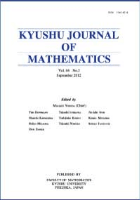
Kyushu Journal of Mathematics
Scope & Guideline
Advancing mathematical frontiers with every publication.
Introduction
Aims and Scopes
- Differential Equations and Asymptotic Analysis:
The journal frequently publishes works related to differential equations, including hypergeometric differential equations and asymptotic representations, highlighting their importance in mathematical physics and complex analysis. - Algebraic Structures and Representation Theory:
Research on algebraic structures, particularly Lie algebras and their representations, is a prominent theme, reflecting the journal's commitment to exploring foundational aspects of algebra. - Number Theory and Special Functions:
The journal features articles on number theory, particularly those involving zeta functions and congruences, showcasing its role in advancing understanding in this classical mathematical area. - Geometric Analysis and Topology:
Papers on geometric flows, surfaces, and topological properties emphasize the journal's engagement with geometric analysis, providing a forum for innovative approaches to classical problems. - Complex Analysis and Function Theory:
The inclusion of studies on elliptic functions and modular forms indicates a sustained interest in complex analysis, connecting various mathematical fields through the study of special functions.
Trending and Emerging
- Hypergeometric Functions and Their Applications:
The increasing number of articles related to hypergeometric functions suggests a renewed interest in their properties and applications, particularly in solving complex differential equations. - Advanced Topics in Modular Forms and Zeta Functions:
The journal has seen a rise in research on modular forms and zeta functions, indicating a trend towards deeper investigations into their relationships and implications in number theory. - Elliptic and Cusp Forms:
There is a growing focus on elliptic and cusp forms, reflecting their significance in modern mathematical research, particularly in relation to number theory and algebra. - Qualitative Analysis of Differential Equations:
Emerging themes in qualitative properties of differential equations highlight a trend towards understanding the behavior of solutions beyond mere existence, emphasizing stability and uniqueness. - Interdisciplinary Connections in Mathematics:
The trend towards interdisciplinary research, particularly in linking abstract mathematical theories to computational or algorithmic applications, showcases the journal's responsiveness to contemporary mathematical challenges.
Declining or Waning
- Applications in Mathematical Physics:
There has been a noticeable decrease in papers directly linking mathematics to physical applications, suggesting a shift towards more theoretical explorations rather than applied mathematics. - Elementary Number Theory:
Research focused on elementary aspects of number theory has become less frequent, indicating a potential waning interest in this foundational area as the journal gravitates towards more complex and abstract themes. - Classical Geometry:
The coverage of classical geometric constructs and their properties appears to be diminishing, with a shift towards more modern geometric analysis and topology.
Similar Journals
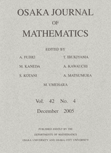
OSAKA JOURNAL OF MATHEMATICS
Exploring New Dimensions of Mathematical KnowledgeOSAKA JOURNAL OF MATHEMATICS, established in 1949 and published from Japan, stands as a reputable platform dedicated to advancing the field of mathematics. With an ISSN of 0030-6126, this journal showcases research in various mathematical disciplines, contributing significantly to both theoretical and applied mathematics. Though it currently holds a Q3 designation in the miscellaneous mathematics category, the journal aims to enhance its impact and visibility within the academic community. Researchers can benefit from the latest insights and findings, making it an essential read for anyone involved in mathematical studies. The journal emphasizes quality over quantity, providing a selective peer-reviewed process that ensures rigorous academic standards. Furthermore, while it is not an open-access journal, it maintains a commitment to disseminating valuable mathematical knowledge across the globe, serving the scholarly community through traditional subscription-based access. OSAKA JOURNAL OF MATHEMATICS is an invaluable resource for professionals, researchers, and students seeking to stay at the forefront of mathematical research and discussions.
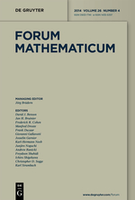
FORUM MATHEMATICUM
Connecting Ideas: A Hub for Mathematical ExcellenceFORUM MATHEMATICUM, published by WALTER DE GRUYTER GMBH, is a distinguished academic journal based in Germany, known for its significant contributions to the field of mathematics. With an ISSN of 0933-7741 and an E-ISSN of 1435-5337, the journal features comprehensive studies ranging from applied mathematics to diverse mathematical disciplines. Having maintained a commendable presence since 1989, FORUM MATHEMATICUM has achieved notable classification rankings, including Q2 in Applied Mathematics and Q1 in miscellaneous Mathematics as of 2023. Additionally, it holds a Scopus rank within the top 60th percentile in General Mathematics, making it a prominent platform for researchers and professionals seeking rigorous analysis and innovative methodologies in mathematics. While the journal does not currently offer open access, its rich content is pivotal for advancing mathematical theory and applications, appealing to students and seasoned academics alike.

ANNALI DI MATEMATICA PURA ED APPLICATA
Unveiling Innovative Solutions in MathematicsANNALI DI MATEMATICA PURA ED APPLICATA is a prestigious journal published by Springer Heidelberg, focusing on the field of Applied Mathematics. With a rich history dating back to its initial publication stages from 1858, this journal continues to serve as a vital platform for researchers and professionals seeking to disseminate high-quality, peer-reviewed research. The journal's strong reputation is reflected in its Q1 ranking in Applied Mathematics and its Scopus rank of #335 out of 635, placing it in the 47th percentile, showcasing its impact in the field. Although it is not an open-access journal, it provides exclusive insights and advancements in mathematical applications, allowing academics to explore innovative methodologies and theoretical developments. The combination of its long-standing tradition and contemporary relevance makes ANNALI DI MATEMATICA PURA ED APPLICATA an essential resource for scholars and students looking to deepen their understanding of mathematics and its practical applications.
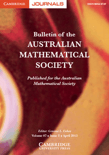
BULLETIN OF THE AUSTRALIAN MATHEMATICAL SOCIETY
Showcasing Pivotal Research for a Brighter Mathematical FutureBULLETIN OF THE AUSTRALIAN MATHEMATICAL SOCIETY is an esteemed journal dedicated to advancing the field of mathematics, published by Cambridge University Press. Since its inception in 1969, this periodical has fostered scholarly communication and showcased pivotal research in various domains of mathematics, now projected to continue until 2024. With an impact factor that places it in the Q2 category of miscellaneous mathematics research, it holds a notable position among its peers, ranking 215th out of 399 in the Scopus database. Though it does not currently offer open access options, the journal remains a vital resource for researchers, professionals, and students seeking to deepen their understanding of mathematical advancements. The Bulletin serves as a crucial platform for disseminating original research, comprehensive reviews, and insightful perspectives that navigate the complexities of mathematics today, ensuring the community is well-informed and engaged.

Ukrainian Mathematical Journal
Exploring Diverse Mathematical LandscapesThe Ukrainian Mathematical Journal is a prominent academic publication in the field of mathematics, focusing on a diverse range of topics that appeal to researchers, professionals, and students alike. Published by Springer, this journal has been an important platform for disseminating significant mathematical research since its inception in 1957. With the aim of fostering knowledge and collaboration within the mathematical community, the journal curates high-quality articles that meet rigorous scholarly standards, evidenced by its Q3 ranking in the miscellaneous mathematics category for 2023. Although it currently does not offer open access, the journal remains accessible through various institutional subscriptions. It serves as a vital resource for ongoing discourse in the field and invites contributions that further advance mathematical understanding.
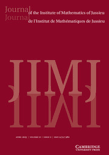
Journal of the Institute of Mathematics of Jussieu
Uniting Global Minds in the Pursuit of Mathematical ExcellenceJournal of the Institute of Mathematics of Jussieu, published by Cambridge University Press, is a leading academic journal that has established itself as a vital resource in the field of mathematics. With an impressive impact factor and a ranking in the top quartile (Q1) of miscellaneous mathematics, the journal serves as a platform for high-quality research from both established scholars and emerging researchers. Spanning from 2002 to 2024, the journal aims to foster collaboration and innovation in the mathematical community by publishing original research articles, reviews, and critical discussions on a wide range of mathematical topics. Although the journal does not offer open access, it remains widely accessible through various academic institutions and libraries, ensuring that critical advancements in mathematics are shared with a global audience. Located in the United Kingdom at the prestigious Cambridge campus, the journal reflects the rigorous standards of its publisher and the rich academic tradition of its home institution.
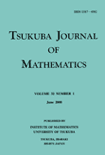
Tsukuba Journal of Mathematics
Advancing Mathematical Frontiers with Rigorous ResearchTsukuba Journal of Mathematics is a distinguished publication dedicated to advancing the field of mathematics through the dissemination of innovative research and comprehensive studies. Published by the University of Tsukuba, Department of Mathematics, this journal serves as a vital platform for mathematicians, researchers, and students to engage with cutting-edge mathematical theories and methodologies. Although currently not available as an open-access journal, it maintains a strong academic presence, contributing significantly to the global mathematical landscape. The journal invites submissions across various branches of mathematics, aiming to foster scholarly communication and collaboration. The ISSN 0387-4982 and the E-ISSN 2423-821X further establish its credibility and accessibility among the academic community, supporting its critical objective of facilitating high-quality research output. Situated in Tsukuba, Japan, a hub for scientific research and development, the Tsukuba Journal of Mathematics is committed to bridging gaps in mathematical knowledge and encouraging exploration of novel ideas.

Computational Methods and Function Theory
Innovating solutions for complex mathematical challenges.Computational Methods and Function Theory is a distinguished journal published by SPRINGER HEIDELBERG, dedicated to advancing the fields of computational mathematics and functional analysis. With its ISSN 1617-9447 and E-ISSN 2195-3724, this journal serves as a vital resource for researchers, professionals, and students seeking to explore state-of-the-art methodologies and theoretical developments from 2011 to 2024. Its robust ranking positions it in the Q3 category for Analysis and Computational Theory and Mathematics, and Q2 for Applied Mathematics, reflecting the journal's influence and credibility within the scientific community. Residing in Germany, the journal promotes open dialogue and innovative solutions to complex mathematical problems, making significant contributions to both theoretical and applied disciplines. Its impact is evidenced by strong Scopus rankings, asserting its relevance and rigorous peer-review processes, which ensure high-quality publications. This journal stands as a key platform for disseminating groundbreaking research and fostering collaboration across disciplines.

Russian Mathematics
Discovering New Horizons in Mathematical ResearchRussian Mathematics is an esteemed journal published by PLEIADES PUBLISHING INC, specializing in the field of mathematics. With its ISSN 1066-369X and E-ISSN 1934-810X, this journal serves as a vital platform for disseminating innovative research and advancements in various branches of mathematics. Established in 1992, it has earned its place in the Q2 category of the mathematics (miscellaneous) discipline, reflecting its growing influence and reputation within the academic community. Although it is not an open-access journal, its rigorous selection process ensures that only high-quality research is published, making it an invaluable resource for researchers, professionals, and students seeking in-depth insights into mathematical theories and applications. The journal has documented its evolution through a converged years format from 2010 to 2024, emphasizing its commitment to fostering scholarly discourse. With its address located at PLEIADES HOUSE, 7 W 54 ST, NEW YORK, NY 10019, UNITED STATES, Russian Mathematics is poised to contribute significantly to the global mathematical community.

HOUSTON JOURNAL OF MATHEMATICS
Elevating the Standards of Mathematical InquiryHOUSTON JOURNAL OF MATHEMATICS, published by the University of Houston, serves as a valuable platform for disseminating significant findings in the field of mathematics, specifically within the realm of miscellaneous mathematics. Despite its current categorization in Q4 for 2023, the journal plays a crucial role in fostering academic discussion and exploration among researchers, professionals, and students alike. With its ISSN 0362-1588, the journal has been publishing original research since 1996, with a recent gap filled from 2022 to 2023, thereby continuing to contribute to the mathematical community. While it does not currently offer open access options, the journal's commitment to quality research maintains its relevance within the field and invites submissions that can elevate its standing. Located in the vibrant city of Houston, Texas, the journal not only emphasizes theoretical advancements but also encourages applied mathematical research that intersects with other disciplines, enhancing its significance and reach.